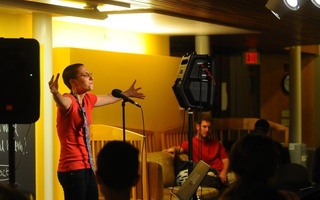Many transnational corporations with U.S. headquarters are not holding to their own standards for worker rights, Alice Kwan, a researcher with the Hong Kong Christian Industrial Committee, told an audience of about 100 last night in Ticknor Lounge.
In an hour-long talk called "Sweatshops: The Good, the Bad, and the Ugly," Kwan described the living and working system in South China, where many U.S. companies have factories.
Harvard Students against Sweatshops sponsored the talk.
"Most Chinese workers work 12 to 17 hours a day, seven days a week," Kwan said. "Low wages urge them to work nonstop, day by day, week by week."
Kwan's group gets information from workers, although it is not actually allowed inside the factories.
Many workers live in company-owned dormitories directly next to the factories they work in, Kwan said. Their living fees are often deducted directly from their paychecks.
"Qualities of the dorms and food are awful," Kwan said. "It's like a campus, but not a nice campus like Harvard."
During her talk, Kwan brandished a bright-red report with the face of Mickey Mouse on it. The report detailed the working standards of toys made for the Disney Corporation, Kwan said.
"Our latest report is called 'Beware of Mickey,'" she said, eliciting laughter from the audience.
The audience sobered when Kwan summarized the contents of the report.
"The wages are not sufficient to sustain a basic life," she said.
Furthermore, companies often bypass minimum wage laws by paying workers for less time than they are actually working.
"In the peak season, most of them have to work overnight," she said.
Factories fine workers for wearing jeans, getting water or going to the bathroom without permission from managers, practices that further decrease wages.
"Workers are not allowed to organize," she said. "They have no collective bargaining power."
Kwan urged audience members to avoid boycotts--which she said might end up hurting the workers--and to instead push corporations to follow through on self-imposed standards set for workers. She called for students to pressure Harvard, which Kwan said owns shares of Disney stock.
Kwan's stance on boycotts surprised some audience members.
"What I realized is that it's really important to take intelligent action," said Danna Katz, a Cambridge resident. "I was one that would boycott. Now I realize that's not really helpful."
Read more in News
IOP Stable Despite Structural ChangesRecommended Articles
-
CouchSurfing Guests Banned from HousesThe Office of Student Life has forbidden students in upperclassmen Houses from hosting overnight guests they meet through the online hospitality exchange network CouchSurfing.org, Mather House Master Michael D. Rosengarten and Adams House Master John G. "Sean" Palfrey ’67 confirmed yesterday.
-
Preview: "Skinwalking"A story of religion, fantasy, and family, “Skinwalking” weaves an intricate tale of mystery and emotion.
-
‘Far Away’ Hits Close to Home“Far Away” is a haunting vision of humanity and chaos portrayed with almost minimalist restraint, an artistic choice that allows the powerful, understated acting to take center stage.
-
 Students Discuss Mental Health Through Spoken Word, Dance, Conversation
Students Discuss Mental Health Through Spoken Word, Dance, Conversation -
'Yes or No?' Engages with AudienceOpening in Agassiz Theatre tonight, “Yes or No?” promises to be a provocative performance. Sponsored by the Office of Sexual ...
-
 Art Therapy
Art Therapy













